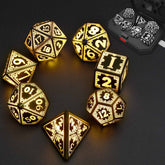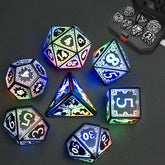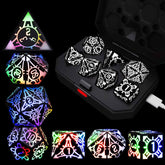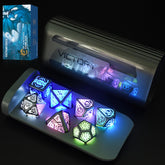Physical Dice vs. Digital Dice
Dice are an integral part of many forms of entertainment. Many players face a decision when choosing between physical dice and virtual dice. This article takes an in-depth look at the pros and cons of physical dice and virtual dice, explores the factors that influence player choice, and aims to help players make more informed decisions.

What are physical dice?
Physical dice are tangible, three-dimensional objects, usually made of materials such as plastic, metal, or wood. They are used to generate random numbers in a variety of games, including tabletop games, board games, role-playing games, gambling, and educational activities.

Advantages of physical dice
Tactile Experience: The gaming experience is enhanced by the tactile pleasure of handling physical dice, feeling the weight of the dice, and experiencing the satisfying click of the dice as they roll across the surface.
Offline interaction: Physical dice promote face-to-face social interaction, when players gather around the table to play tabletop games such as monopoly and dnd, sharing the excitement or disappointment of each roll and jointly predicting the outcome of the game.
Traditional Charm: Solid dice are deeply rooted in tabletop gaming tradition, evoking a sense of nostalgia and authenticity that resonates with many players.
Collectibles: A wide variety of materials, designs, and additional features make physical dice collectible. Some rare dice can have huge monetary and sentimental value.
What are virtual dice?
Virtual dice refer to digital representations of dice used to simulate the randomness and number generation associated with physical dice. They are popular among online games, mobile apps, and digital platforms due to their convenience and reliability.

Advantages of virtual dice
Low cost of use: Virtual dice can be used for free on various online platforms, reducing the cost of purchasing physical dice.
Ease of use: Virtual Dice can be accessed and used anytime, anywhere via an internet-connected device, providing flexibility and accessibility.
Online Compatibility: Virtual Dice is ideal for online gaming, allowing players from different locations to participate in games requiring random number generation.
Customizability: Many virtual dice rollers offer a high degree of customization, allowing players to select the number of sides and customize sound effects, thereby enhancing the overall gaming experience.
In summary, the choice between physical and virtual dice depends on personal preference, the nature of the game and practical considerations. Physical dice offer a tangible, traditional and collectible experience, while virtual dice offer convenience, cost-effectiveness and online compatibility. Understanding these differences can help players make the right choice for their gaming needs.







